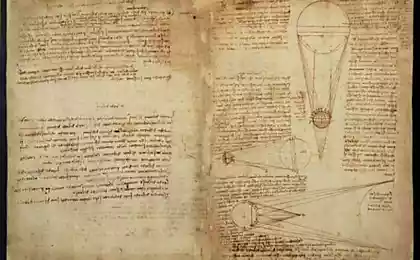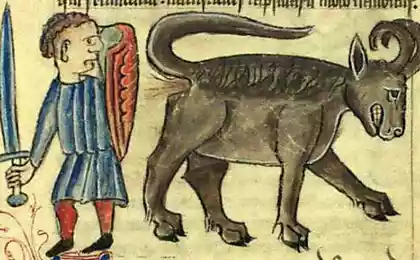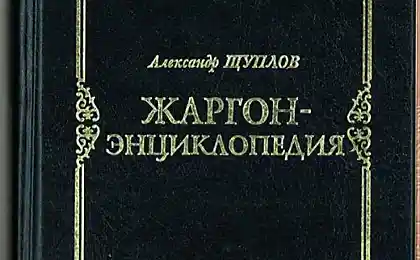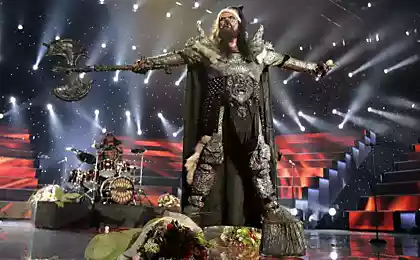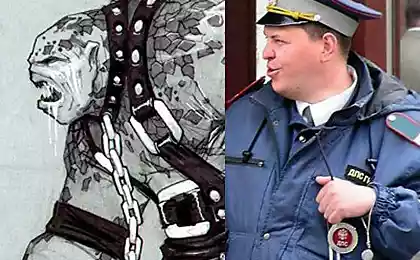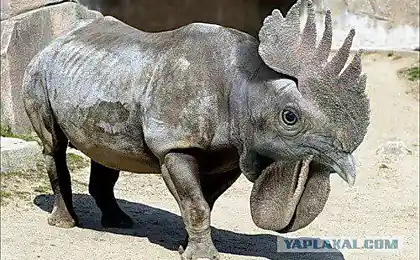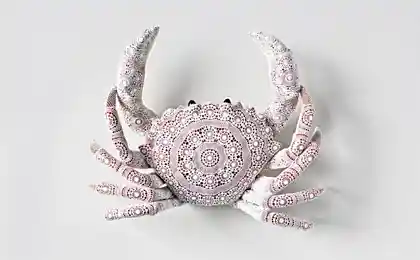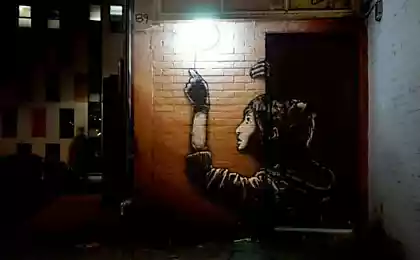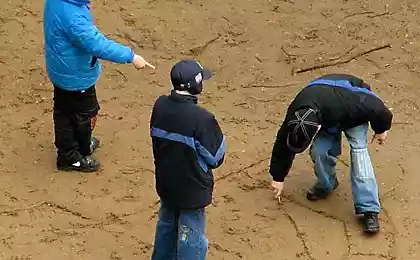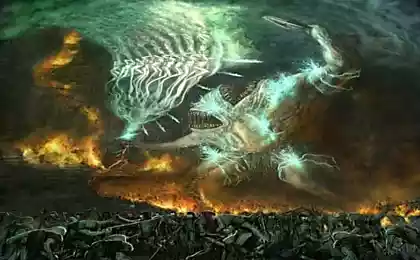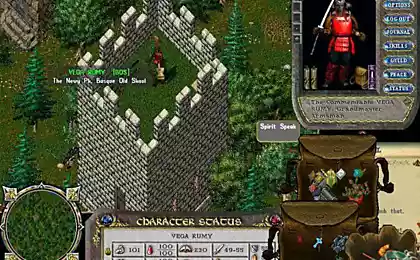3572
Slavic Bestiary
Post-ABC Slavonic babaykam!)
Antsybal - Marsh features in Slavic mythology.
Title antsybal often refers to evil spirits inhabiting in the swamp. This title is strengthened in abusive terms: "Oh, you antsybal sort!" (Kursk region.) "Anchibal you damn!", "Damn you picked anchibil" (Orel.)
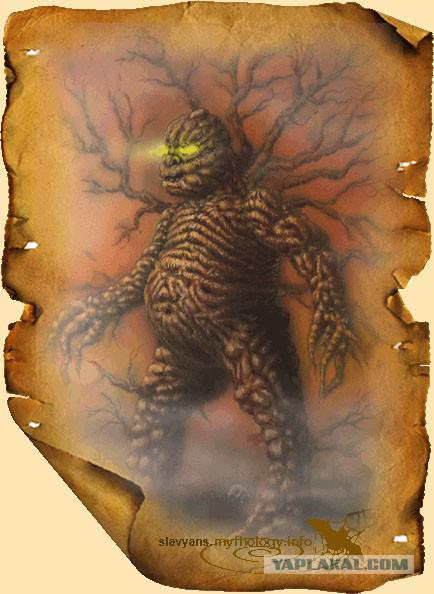
Berendei - in Slavic mythology - the people-moving bears. Usually it was quite strong wizards or enchanted by them people. This could spell a werewolf or a sorcerer himself imposing the werewolf curse, or death of the sorcerer.
In the animated film "Prince Vladimir" beautifully shown sorcerer -berendeya.
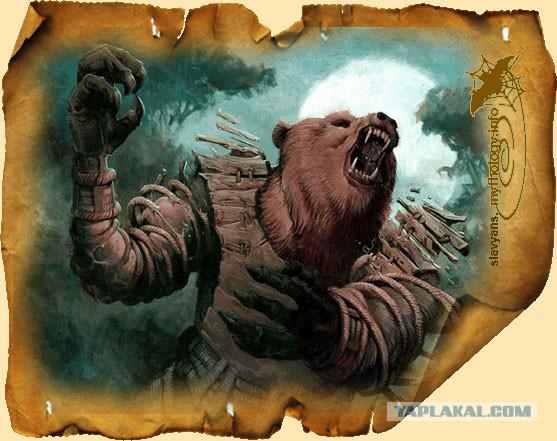
Vytyanka - longing soul unburied bones; "Singing Bone" in Slavic mythology.
The only known mention of vytyanke find in the beliefs of Kostroma region: the villagers Galich County Kitovrazovo hear on Easter Eve, as "howling vytyanka" - "is the soul (or spirit) unburied bones asks to bury them."
In the same province believed that "bone crying" and in the graves of those killed innocently. According to peasant belief, soul nerogrebennogo lives near the body, protecting it until the body will be buried. To the light a soul is not allowed. "Tosca bone" - one of the oploscheny "Ghostwalker dead man" or his soul.
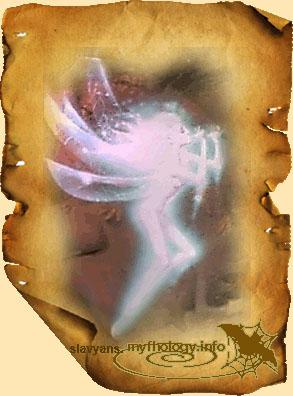
Griffin - in Slavic mythology - the winged monster-bird with a lion's body and an eagle's head, the guard.
Griffins have long been found in Slavic ornaments where they perform oberezhnuyu role - the role of custody. This bracelets and embroidery and home decoration gate. We can say that this is one of the favorite SPCA Slavs. He was not even able to destroy Christianity, and images of this miracle bird can be found at the gates of the church of the Nativity Cathedral in Suzdal in 1230-ies.
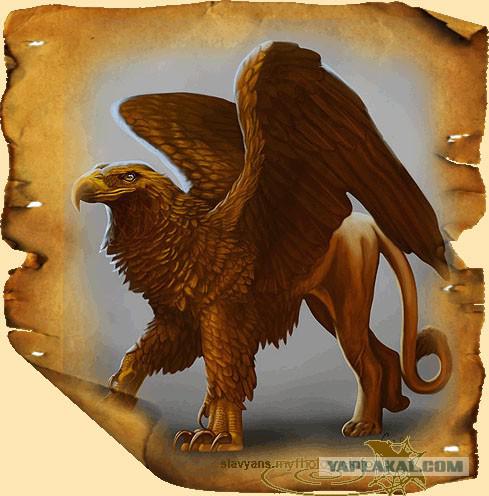
Div - Demonic character of the East Slavic mythology. Mentioned in medieval sermons against the pagans. Russian divas perceived as a humanoid creature or biradlike.
Researchers have not come to a consensus about the origin of the word "diva". On the one hand, it is associated with the word "miracle" - the other -with the adjective "divy" - wild. In addition, with the root "divas" related Indo-European designation of God. Echoes of the last value is in the episode "Lay", where the expression "vrzhesya divas on the ground" is seen as a harbinger of misfortune.
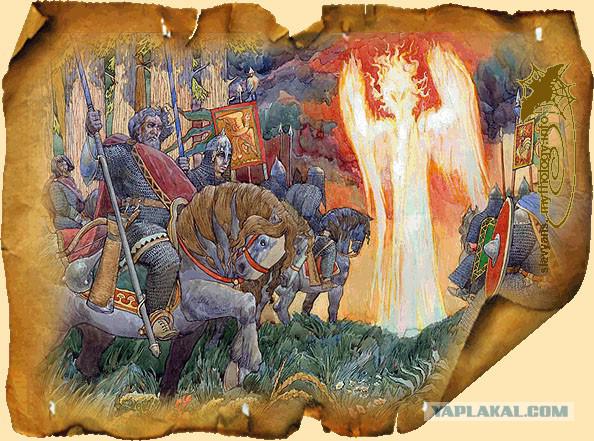
Endar - fairy-tale characters in the legends of ancient Slavs.
According to legends in the Vyatka province, endar lives under an old oak tree is powered by air. Size of it with wild boar. More he can not be described - its functions and appearance is not clear. Heat -ptitsa - fiery bird the size of a peacock. Feathers its light blue color, and armpits raspberry. On its tail can be easily burned. Precipitated pen for a long time retains the properties of feathers Firebird. It shines and gives warmth. And when it goes off the pen turns to gold. Firebird guards fern flower
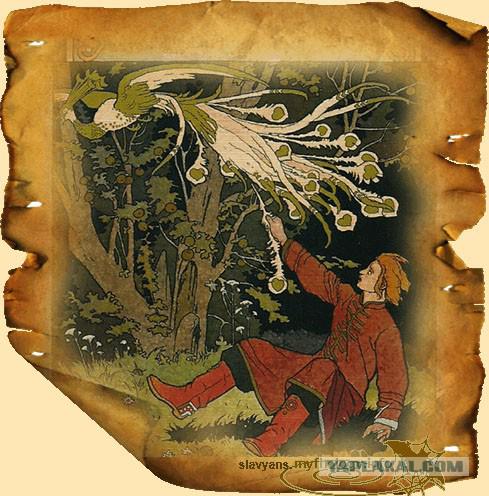
Sinister - pagan evil spirits of the ancient Slavs, the embodiment Nedolya, navi minions.
Sinister - thin. Boris Zabirokhin
As well they are called Creeks or Khmyrov - marsh spirits that the dangerous that can hit the person, even dwell in him, especially in his old age, if the life of a man loved nobody and had no children.
Sinister is not a well-defined shape (say, but invisible). It can turn around man, a young child, the poor old man. At Yule game Sinister represents poverty, misery, the winter darkness. (In the resin. Reg.)
The house Sinister often settle for the oven, but loves and suddenly jump on the back, shoulders, man "ride" on it. Sinister may be several (up to twelve, that suggests a connection with their tryasovitsami, which was also twelve). However, show some ingenuity, they can be overfished, locking, concluding in any - any capacity.
"Documentary mention of the Sinister back to the XV century. In the old "words about lazy" (on the list of the XV century.) Is such a place: "Then the man approaching Sinister ... but will embrace him about the head, yes prostrutsya him on the ridge, but sit in his prose with a broom, today put polzhenzi Kaliti, and zavtreyah enough - Sinister taken out. '" & Lt; Sumtsov 1913 & gt;
Sinister - character more typical of the beliefs of the southern, south - western regions of Russia; most of the Sinister tells fairy tales.
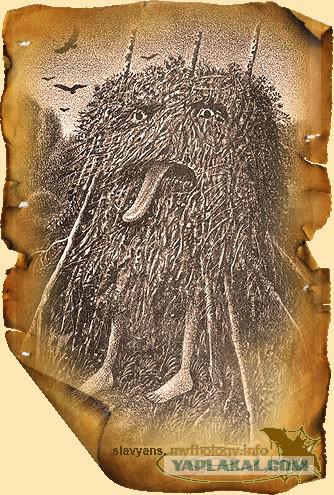
Indrik- beast - in Russian legends Indrik acts as the "father of all the beasts." It may have one, and two horns. A similar description is found in the Book of Doves.
In Russian fairy tales Indrik portrayed as an opponent of the snake, which makes it difficult to draw water from the well. In fairy tales image Indrikov represents a fantastic animal that produces the protagonist. Some fairy tales he appears in the royal garden instead of Firebird and stealing the golden apples.
The hero is sent to the underworld in his footsteps. He finds Indrikov, to join with him in battle and defeats him. Indrik became assistant hero.
Very few people have seen, and even more alive, because we know that all his life he spent underground, working his skill and groundwater moves his single horn, and when it will come out in the white light, then immediately hardens. Northerners call it by its large earth Mouse, although mouse had only the tail is. Indrik produces underground earthquake when much played out.
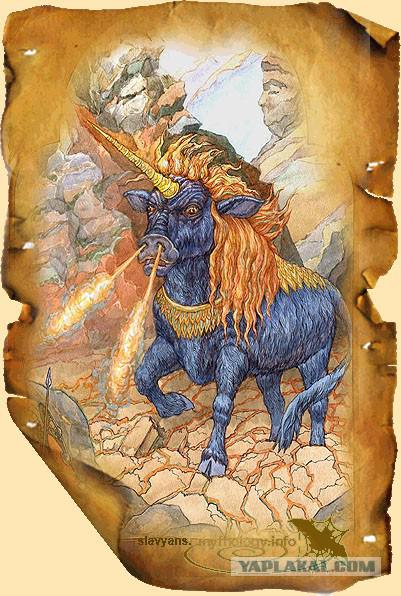
Kolovertyshi, Kolovershi - in Russian mythology creatures to help witches, wizards; accumulate a wealth and bring it into the house. "Morozov Lyonka kids, kolovershi all dragged home" (Kuyb.).
In Tambov kolovertysh beliefs - a fantastic creature, Assistant witches. He looks like a hare, but he has a big front bag-shaped crop. In this "bag" kolovertysh takes extracted witch milk, butter, and pour out their house in a bowl, which has prepared a witch. Kolovertysha may have the appearance of a black cat (also with goiter-bag), live under the floor under the stove or in people endowed with magical skill (Thumb.). "Kolovert" means "fast", "agile".
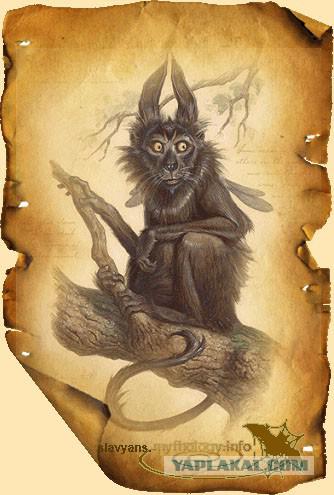
Lyavra - In Slavic beliefs lyarva evil female spirit who loves to vandalize and fornicate. It is capable to become implanted in women and then they become walking and wench.
Lyarva - Monster, the inhabitant of hell spawn spirit has not received due burial. Larva wanders at night and sends people crazy. Lyarvy breathing toxic.
Magna - In Russian superstition - a ghost, an evil spirit in the form of a shooting star.
Magna like manna - "mereschuscheesya", "alluring" being correlated with an unclean spirit, a ghost, but has a number of specific characteristics of beliefs.
V.Dal reports that maniac - "a ghost", the vision, the spirit "; Magna - "ugly old woman with a crutch." It "wanders through the world, looking for her son ruined» & lt; Dahl, 1881 & gt;
So we can divide these unclean spirits into male and female. Magna and mana.
Next. In the north, north - east of Russia and Siberia Magna - a ghost, most often in the guise of an old, frail woman. (Irk.) & Lt; Buslayev 1861 & gt; (Classes are available in its materials are not described.)
The fact that Magna can turn around falling star and its translation as "alluring" makes it very similar to letavitsey, as well as appearing in a shooting star.
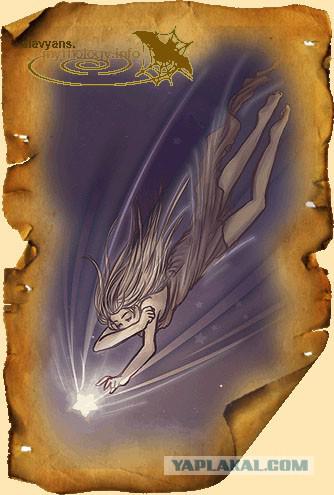
Navii (navi) - from the Old Nav - the spirits of death, the spirits of the dead foreigners. It was believed that they could send the disease to humans and livestock, as well as natural disasters.
At night navi rush through the streets, affecting everyone who leaves the house. People died from his wounds. Then navi steel and Denham appear on horses, but were invisible. For the salvation of the navy had to leave the house. To protect your home, were required amulets, charmed objects, etc. Clothing men include special embroidery with enforcement signs of navy.
Navy and could appease. They were invited to wash the bath, under a canopy or roof which allowed them to eat. Represented in the form of birds navy, or in the form of a creature, overgrown with thick hair and tail. Similar ideas about navyah remained in people's minds to the twentieth century.
There was among the Eastern Slavs even a special "day of navy" for All Souls, he said on Thursday during Easter week and the beginning of autumn. It was believed that on this day navii come out of their graves and go to their descendants in the memorial meal.
For navy prepared a special treat that put on the table in the room, then opened the windows. Not to interfere with naviyam categorically forbidden to go out after sunset.
Against the navy also use special oberegatelnaya rites. If navii us harm, should dig up the grave of the deceased and withdraw from it "navyu bone" - not only decomposed by the time the bone of the deceased. Bone was supposed to burn, and the ashes cast to the tomb. Navia then disappear and cease to disturb the living.
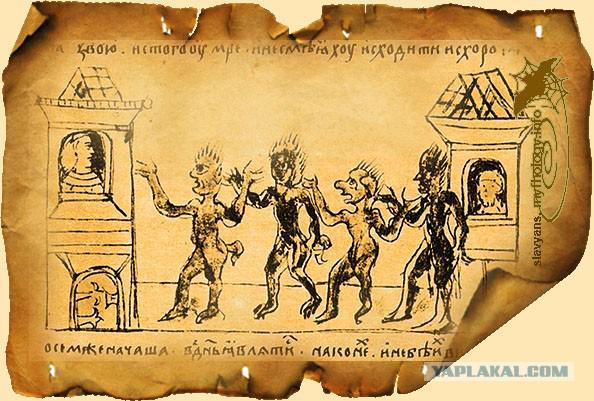
Snakes Ognyanik - South Slavic winged dragon. He lives on the rocks, sometimes in caves, and sometimes - right on the cloud. Flying, he spews fire. The body is covered with shiny ognyanika, to cast all the colors of scales. Fire reflected in it, and the flight of the dragon looks like a flash of lightning. He falls to the ground with the noise and thunder, scattering sparks.
Polkan - in Slavic mythology poluchelovek Half-Horse. (Analogue apparently centaur) In the original version of the name Polkan is Russified form of the Italian word "polikano" - polupes. On numerous as splints Polkan represented as traditional centaur. It acts as an antagonist and protagonist dies of his hands.
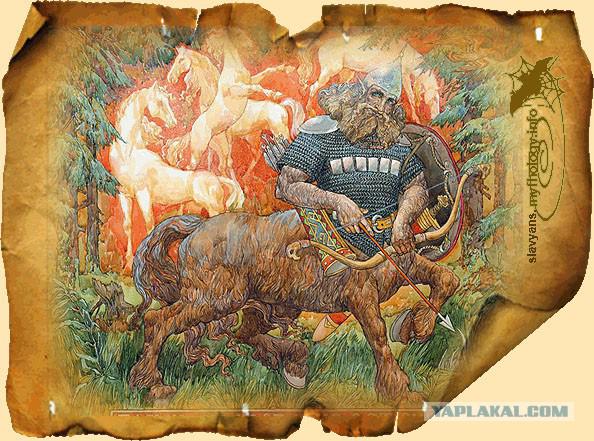
Antsybal - Marsh features in Slavic mythology.
Title antsybal often refers to evil spirits inhabiting in the swamp. This title is strengthened in abusive terms: "Oh, you antsybal sort!" (Kursk region.) "Anchibal you damn!", "Damn you picked anchibil" (Orel.)

Berendei - in Slavic mythology - the people-moving bears. Usually it was quite strong wizards or enchanted by them people. This could spell a werewolf or a sorcerer himself imposing the werewolf curse, or death of the sorcerer.
In the animated film "Prince Vladimir" beautifully shown sorcerer -berendeya.

Vytyanka - longing soul unburied bones; "Singing Bone" in Slavic mythology.
The only known mention of vytyanke find in the beliefs of Kostroma region: the villagers Galich County Kitovrazovo hear on Easter Eve, as "howling vytyanka" - "is the soul (or spirit) unburied bones asks to bury them."
In the same province believed that "bone crying" and in the graves of those killed innocently. According to peasant belief, soul nerogrebennogo lives near the body, protecting it until the body will be buried. To the light a soul is not allowed. "Tosca bone" - one of the oploscheny "Ghostwalker dead man" or his soul.

Griffin - in Slavic mythology - the winged monster-bird with a lion's body and an eagle's head, the guard.
Griffins have long been found in Slavic ornaments where they perform oberezhnuyu role - the role of custody. This bracelets and embroidery and home decoration gate. We can say that this is one of the favorite SPCA Slavs. He was not even able to destroy Christianity, and images of this miracle bird can be found at the gates of the church of the Nativity Cathedral in Suzdal in 1230-ies.

Div - Demonic character of the East Slavic mythology. Mentioned in medieval sermons against the pagans. Russian divas perceived as a humanoid creature or biradlike.
Researchers have not come to a consensus about the origin of the word "diva". On the one hand, it is associated with the word "miracle" - the other -with the adjective "divy" - wild. In addition, with the root "divas" related Indo-European designation of God. Echoes of the last value is in the episode "Lay", where the expression "vrzhesya divas on the ground" is seen as a harbinger of misfortune.

Endar - fairy-tale characters in the legends of ancient Slavs.
According to legends in the Vyatka province, endar lives under an old oak tree is powered by air. Size of it with wild boar. More he can not be described - its functions and appearance is not clear. Heat -ptitsa - fiery bird the size of a peacock. Feathers its light blue color, and armpits raspberry. On its tail can be easily burned. Precipitated pen for a long time retains the properties of feathers Firebird. It shines and gives warmth. And when it goes off the pen turns to gold. Firebird guards fern flower

Sinister - pagan evil spirits of the ancient Slavs, the embodiment Nedolya, navi minions.
Sinister - thin. Boris Zabirokhin
As well they are called Creeks or Khmyrov - marsh spirits that the dangerous that can hit the person, even dwell in him, especially in his old age, if the life of a man loved nobody and had no children.
Sinister is not a well-defined shape (say, but invisible). It can turn around man, a young child, the poor old man. At Yule game Sinister represents poverty, misery, the winter darkness. (In the resin. Reg.)
The house Sinister often settle for the oven, but loves and suddenly jump on the back, shoulders, man "ride" on it. Sinister may be several (up to twelve, that suggests a connection with their tryasovitsami, which was also twelve). However, show some ingenuity, they can be overfished, locking, concluding in any - any capacity.
"Documentary mention of the Sinister back to the XV century. In the old "words about lazy" (on the list of the XV century.) Is such a place: "Then the man approaching Sinister ... but will embrace him about the head, yes prostrutsya him on the ridge, but sit in his prose with a broom, today put polzhenzi Kaliti, and zavtreyah enough - Sinister taken out. '" & Lt; Sumtsov 1913 & gt;
Sinister - character more typical of the beliefs of the southern, south - western regions of Russia; most of the Sinister tells fairy tales.

Indrik- beast - in Russian legends Indrik acts as the "father of all the beasts." It may have one, and two horns. A similar description is found in the Book of Doves.
In Russian fairy tales Indrik portrayed as an opponent of the snake, which makes it difficult to draw water from the well. In fairy tales image Indrikov represents a fantastic animal that produces the protagonist. Some fairy tales he appears in the royal garden instead of Firebird and stealing the golden apples.
The hero is sent to the underworld in his footsteps. He finds Indrikov, to join with him in battle and defeats him. Indrik became assistant hero.
Very few people have seen, and even more alive, because we know that all his life he spent underground, working his skill and groundwater moves his single horn, and when it will come out in the white light, then immediately hardens. Northerners call it by its large earth Mouse, although mouse had only the tail is. Indrik produces underground earthquake when much played out.

Kolovertyshi, Kolovershi - in Russian mythology creatures to help witches, wizards; accumulate a wealth and bring it into the house. "Morozov Lyonka kids, kolovershi all dragged home" (Kuyb.).
In Tambov kolovertysh beliefs - a fantastic creature, Assistant witches. He looks like a hare, but he has a big front bag-shaped crop. In this "bag" kolovertysh takes extracted witch milk, butter, and pour out their house in a bowl, which has prepared a witch. Kolovertysha may have the appearance of a black cat (also with goiter-bag), live under the floor under the stove or in people endowed with magical skill (Thumb.). "Kolovert" means "fast", "agile".

Lyavra - In Slavic beliefs lyarva evil female spirit who loves to vandalize and fornicate. It is capable to become implanted in women and then they become walking and wench.
Lyarva - Monster, the inhabitant of hell spawn spirit has not received due burial. Larva wanders at night and sends people crazy. Lyarvy breathing toxic.
Magna - In Russian superstition - a ghost, an evil spirit in the form of a shooting star.
Magna like manna - "mereschuscheesya", "alluring" being correlated with an unclean spirit, a ghost, but has a number of specific characteristics of beliefs.
V.Dal reports that maniac - "a ghost", the vision, the spirit "; Magna - "ugly old woman with a crutch." It "wanders through the world, looking for her son ruined» & lt; Dahl, 1881 & gt;
So we can divide these unclean spirits into male and female. Magna and mana.
Next. In the north, north - east of Russia and Siberia Magna - a ghost, most often in the guise of an old, frail woman. (Irk.) & Lt; Buslayev 1861 & gt; (Classes are available in its materials are not described.)
The fact that Magna can turn around falling star and its translation as "alluring" makes it very similar to letavitsey, as well as appearing in a shooting star.

Navii (navi) - from the Old Nav - the spirits of death, the spirits of the dead foreigners. It was believed that they could send the disease to humans and livestock, as well as natural disasters.
At night navi rush through the streets, affecting everyone who leaves the house. People died from his wounds. Then navi steel and Denham appear on horses, but were invisible. For the salvation of the navy had to leave the house. To protect your home, were required amulets, charmed objects, etc. Clothing men include special embroidery with enforcement signs of navy.
Navy and could appease. They were invited to wash the bath, under a canopy or roof which allowed them to eat. Represented in the form of birds navy, or in the form of a creature, overgrown with thick hair and tail. Similar ideas about navyah remained in people's minds to the twentieth century.
There was among the Eastern Slavs even a special "day of navy" for All Souls, he said on Thursday during Easter week and the beginning of autumn. It was believed that on this day navii come out of their graves and go to their descendants in the memorial meal.
For navy prepared a special treat that put on the table in the room, then opened the windows. Not to interfere with naviyam categorically forbidden to go out after sunset.
Against the navy also use special oberegatelnaya rites. If navii us harm, should dig up the grave of the deceased and withdraw from it "navyu bone" - not only decomposed by the time the bone of the deceased. Bone was supposed to burn, and the ashes cast to the tomb. Navia then disappear and cease to disturb the living.

Snakes Ognyanik - South Slavic winged dragon. He lives on the rocks, sometimes in caves, and sometimes - right on the cloud. Flying, he spews fire. The body is covered with shiny ognyanika, to cast all the colors of scales. Fire reflected in it, and the flight of the dragon looks like a flash of lightning. He falls to the ground with the noise and thunder, scattering sparks.
Polkan - in Slavic mythology poluchelovek Half-Horse. (Analogue apparently centaur) In the original version of the name Polkan is Russified form of the Italian word "polikano" - polupes. On numerous as splints Polkan represented as traditional centaur. It acts as an antagonist and protagonist dies of his hands.



